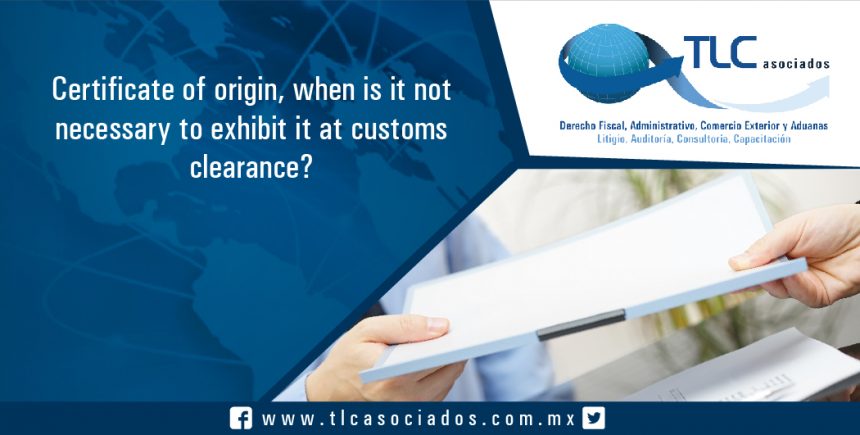
050 – Certificate of origin, when is it not necessary to exhibit it at customs clearance?
Ciudad de México, 13 de marzo de 2017.
Mediante la reciente tesis que al rubro señala “CERTIFICADO DE ORIGEN. SU EXHIBICIÓN NO ES NECESARIA AL MOMENTO DE LA IMPORTACIÓN, PERO DEBE REALIZARSE AL SER REQUERIDO POR LA AUTORIDAD” el Tribunal Federal de Justicia Administrativa, ha resuelto que derivado de la interpretación al artículo 502 (1) (a) (b) (c) del Tratado de Libre Comercio de América del Norte y la Regla 25, fracciones I, II y IV, de la Resolución por la que se establecen las reglas de carácter general relativas a la aplicación de las disposiciones en materia aduanera del Tratado de Libre Comercio de América del Norte, se destacan como obligación a cargo del importador que realice actos comerciales bajo trato arancelario preferencial al amparo del citado convenio internacional, las condiciones siguientes: 1) declarar tal circunstancia por escrito en el pedimento de importación con base en un certificado de origen válido, 2) tener dicho certificado en su poder al momento de realizar la declaración y, 3) proporcionar una copia del mismo cuando sea requerido por la autoridad.
Es en virtud de lo anterior, que el Tribunal Federal de Justicia Administrativa, señala que: no resulta válido el que la autoridad exija que el certificado de origen sea exhibido al momento del despacho aduanero, pues ninguna de las disposiciones a las que se ha hecho referencia establece tal imperativo, por el contrario, son contundentes en prever el deber de ponerlo a disposición de la autoridad aduanera hasta el momento en que le sea requerido, siendo lo anterior complementado con lo dispuesto en la Regla 27 de la citada Resolución, la cual menciona que una vez requerido y exhibido dicho certificado, si la autoridad advierte irregularidades en su contenido, deberá prevenir al importador para que en el plazo de cinco días hábiles presente una copia del certificado en el que haya subsanado la observación detectada.
Sin otro asunto en particular quedamos a sus órdenes para cualquier duda o aclaración respecto de la presente información.
Atentamente
División Legal
TLC Asociados, S.C.
tlcnegocios@www.tlcasociados.com.mx
Prohibida la reproducción parcial o total. Todos los derechos reservados de TLC Asociados, S.C. El contenido del presente artículo no constituye una consulta particular y por lo tanto TLC Asociados, S.C., su equipo y su autor, no asumen responsabilidad alguna de la interpretación o aplicación que el lector o destinatario le pueda dar.
March 13th, 2017 in Mexico City.
Through the recent thesis named “CERTIFICATE OF ORIGIN. ITS EXHIBITION IS NOT NECESSARY AT THE IMPORT BUT MUST BE MADE WHEN REQUIRED BY THE AUTHORITY” the Federal Tribunal of Administrative Justice has decided that from the interpretation of the article 502 (1) (a) (b) (c) of the North American Free Trade Agreement and the Rule 25, sections I, II, and IV of the Resolution by which the general character rules relative to the implementation of the dispositions in customs matters of the North American Free Trade Agreement, it is noted as obligation in charge of the importer that carries out trade actions under the preferential tariff treatment of the mentioned international agreement, the following conditions: 1) declare such circumstance in writing in the import customs declaration based on a valid certificate of origin, 2) have such certificate in their possession at the time of making the declaration and, 3) provide a copy of it when it is requested by the authority.
Due to the above, the Federal Tribunal of Administrative Justice indicates that: the demand from the authority to exhibit the certificate of origin at the customs clearance is not valid since none of the dispositions that have been referred to establish such imperative, on the contrary, they are undisputable in indicating the obligation of giving it to the authority until it is requested. This is complemented with the established in Rule 27 of the mentioned Resolution, which mentions that once such certificate is requested and exhibited if the authority advises that there are irregularities in its contents, it must communicate it to the importers to enable them to correct it in the following five business days.
Without anything else at this moment, do not hesitate to contact us.
Sincerely,
Legal Division
TLC Asociados, S.C.
tlcnegocios@www.tlcasociados.com.mx
Partial or total reproduction is prohibited. All rights reserved to TLC Asociados, S.C. The content of this article is not a private consultation, therefore, TLC Asociados, S.C., and its team and author, are not responsible for any interpretation or use that the reader or recipient could give to it.
Search
Nuestros servicios
- División de Auditoria Preventiva y de Cumplimiento
- División de Certificaciones OEA-NEEC-CTPAT
- División de Certificación en Materia de IVA/IEPS y Recinto Fiscalizado Estratégico
- División de Blindaje Legal
- División de Consultoría
- División de Lobbying
- Gestoría de Permisos Especiales
- Arquitectura Aduanera
- Revista TLC
- Libros TLC
